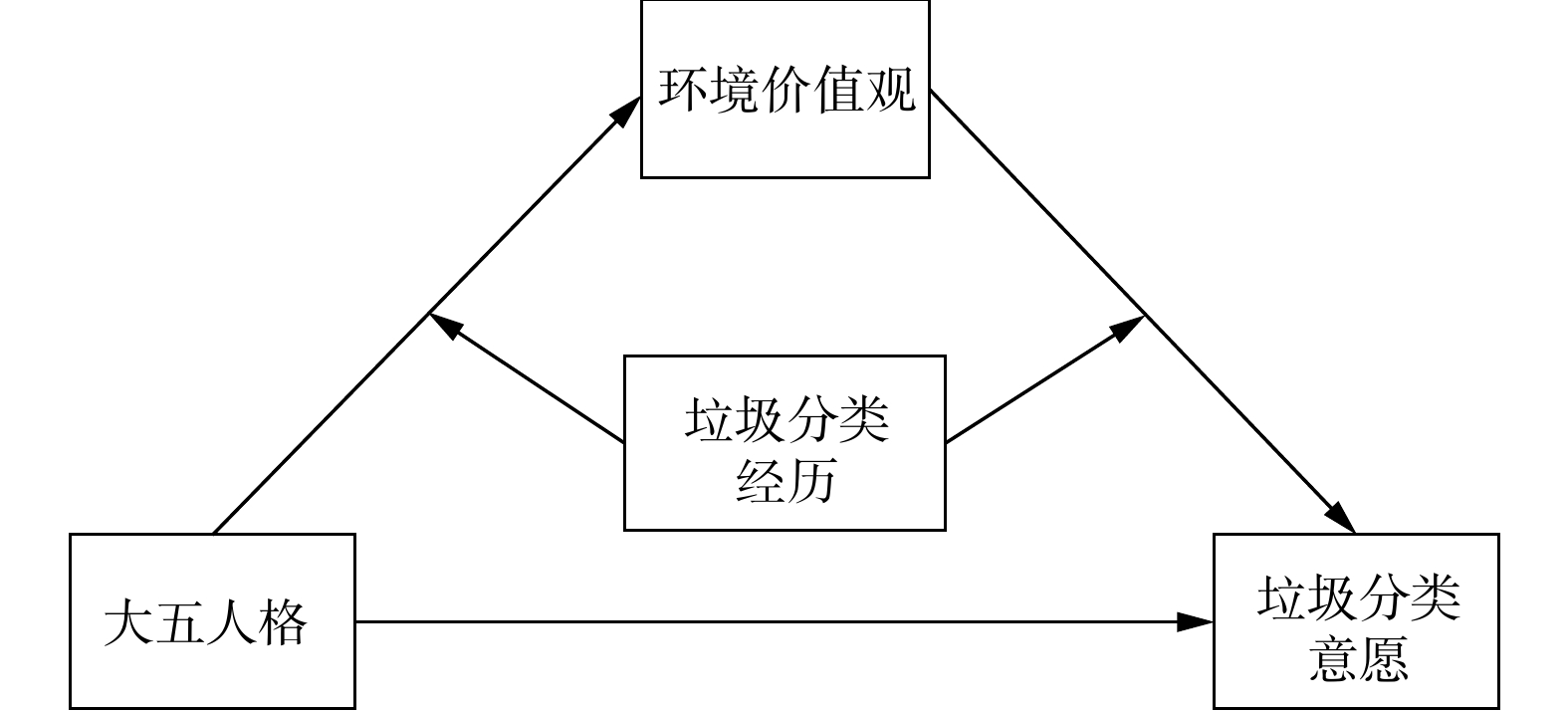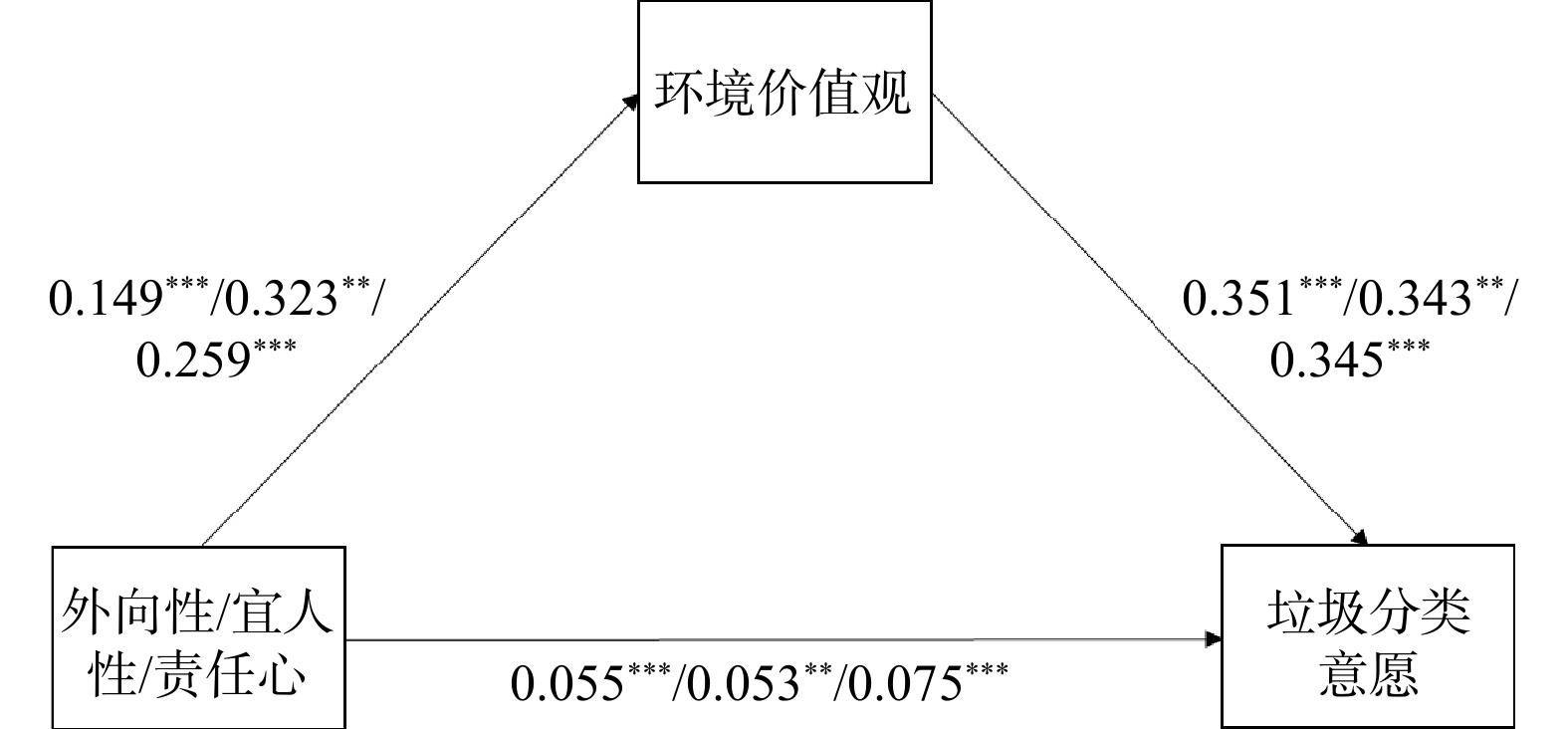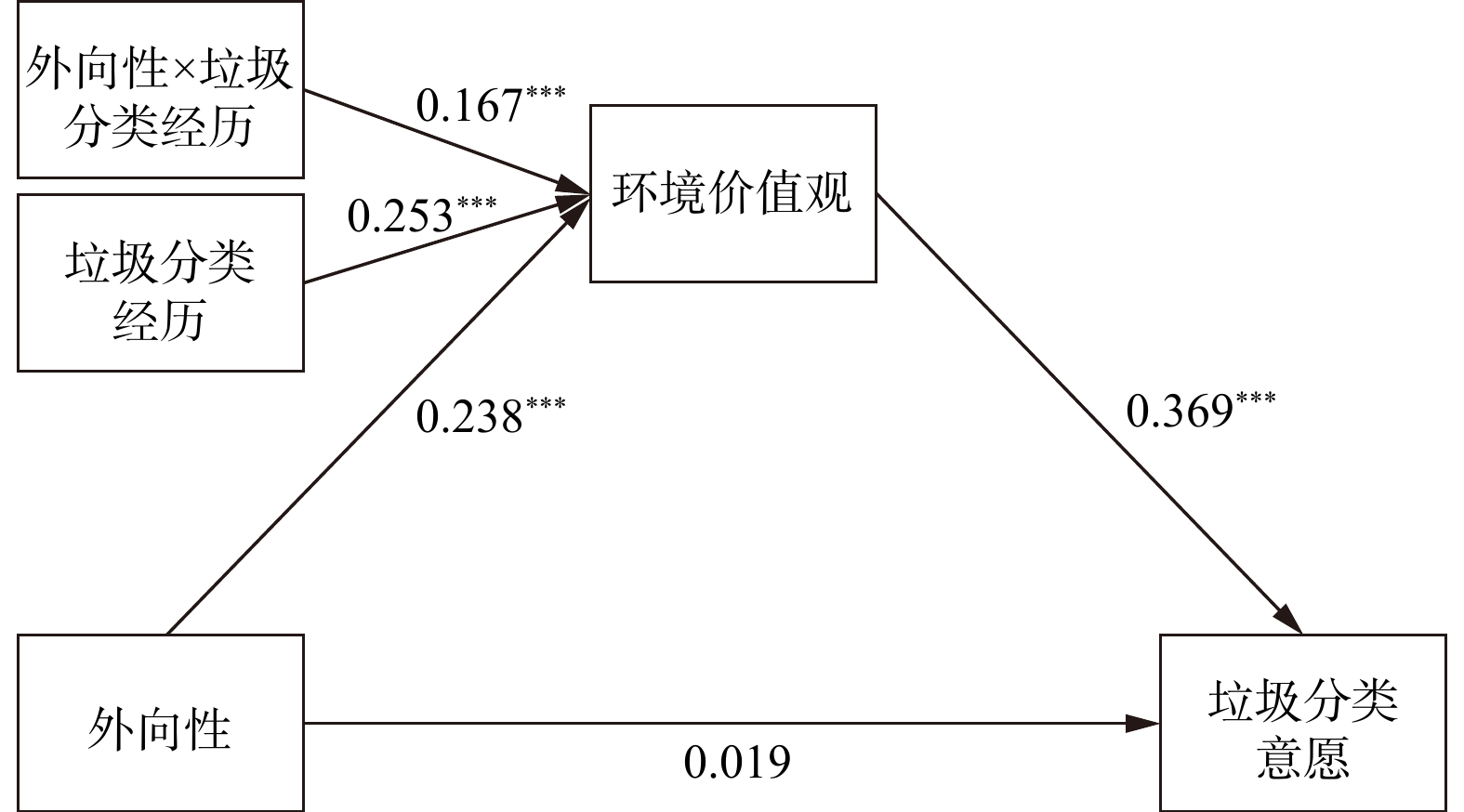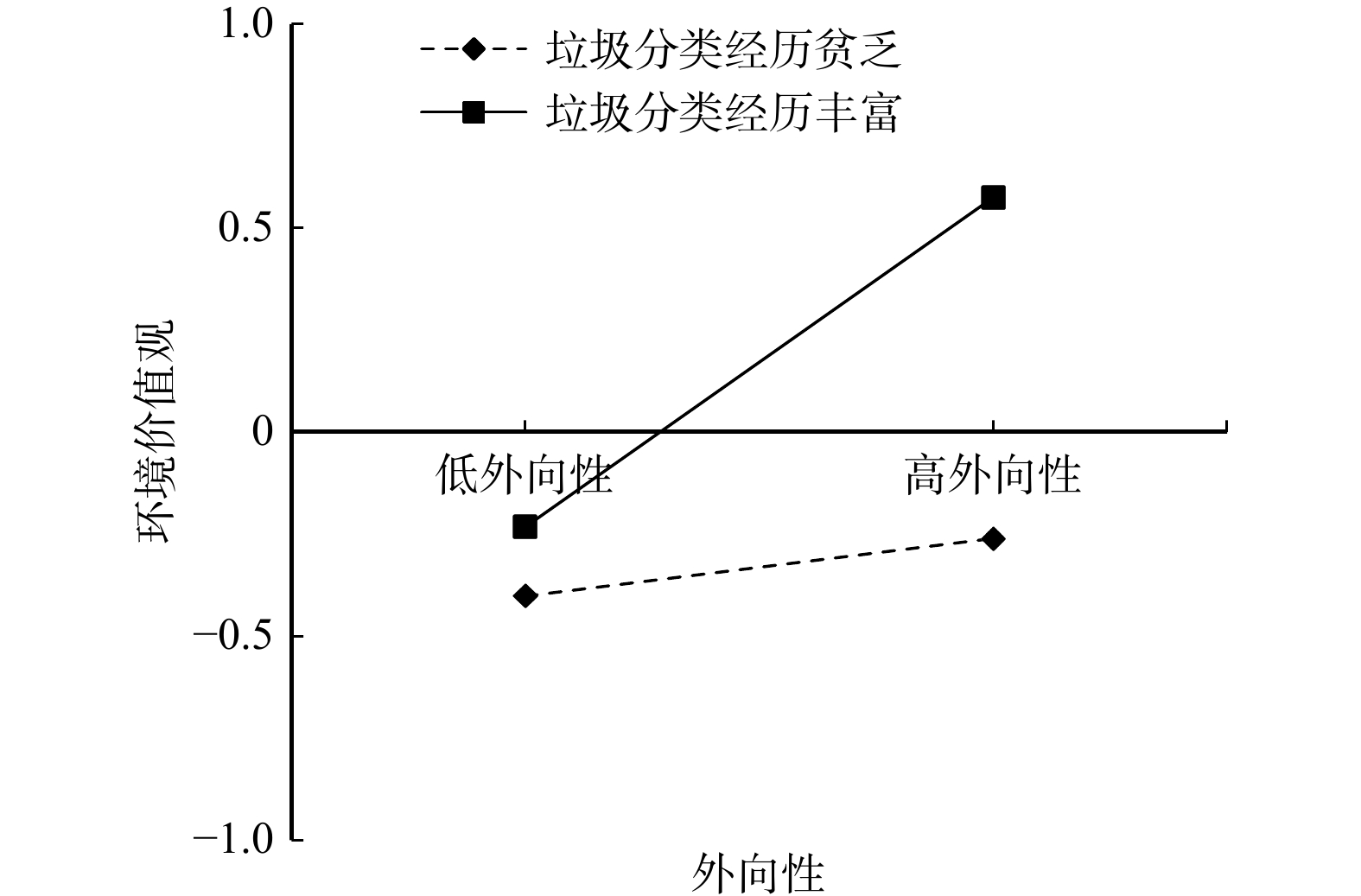The Relationship Between the Big Five Personality and Garbage Sorting Intention among College Students:the Mediating Roles of Environmental Values and Moderating Effect of Garbage Sorting Experience
-
摘要:
采用问卷调查法,选取了821名大学生对其大五人格、环境价值观、垃圾分类经历以及垃圾分类意愿进行测量。结果表明:①大五人格中的责任心、宜人性和外向性均能够显著正向预测大学生的垃圾分类意愿。②环境价值观可以在大五人格的外向性、责任心、宜人性对垃圾分类意愿的预测中起到部分中介作用。③垃圾分类经历能够调节环境价值观在外向性与垃圾分类意愿关系中的中介作用,但不能调节责任心和宜人性的中介模型,具体来说,垃圾分类经历促进了高外向性大学生的环境价值观的形成。结论提示,高责任心、宜人性和外向性不仅直接促进大学生垃圾分类意愿的形成,也可以通过塑造环境价值观来提升垃圾分类意愿,过去的垃圾分类经历会加速这一结果的形成。
Abstract:We recruited 821 college students and used questionnaire survey to measure their Big Five personality, environmental value, garbage sorting experience, and garbage sorting intention. The results showed that: ① Conscientiousness, agreeableness and extroversion of the Big Five personality positively predicted garbage sorting intention. ② Environmental values played a partial mediating role in the relationship between extroversion/conscientiousness/agreeableness and garbage sorting intention. ③ Garbage sorting experience moderated the mediating effect of environmental values on the relationship between extroversion and garbage sorting intention. However, garbage sorting experience did not moderate the mediating effect of environmental values on the relationship between conscientiousness/agreeableness and garbage sorting intention. Specifically, garbage sorting experience promoted the formation of environmental values of college students with high extroversion. The results imply that personality not only directly promotes the formation of college students' garbage sorting intention, but also improves their garbage sorting intention by shaping environmental values. Garbage sorting experience will accelerate the formation of this outcome.
-
-
表 1 各主要变量的相关分析
性别 年龄 家乡是否
实施了垃
圾分类学校是否
实施了垃
圾分类家庭人均
月收入母亲受教
育程度父亲受教
育程度神经质 责任性 宜人性 开放性 外向性 环境价
值观垃圾分
类经历垃圾分
类意愿性别 1 年龄 −0.044 1 家乡是否实施了
垃圾分类−0.110** 0.008 1 学校是否实施了
垃圾分类−0.018 0.015 0.355*** 1 家庭人均月收入 −0.075* 0.063 0.144*** 0.078* 1 母亲受教育程度 −0.019 0.063 0.054 0.017 0.314*** 1 父亲受教育程度 −0.018 0.029 0.083* 0.046 0.294*** 0.643*** 1 神经质 −0.016 0.053 −0.067 −0.047 −0.153*** −0.141*** −0.110** 1 责任性 −0.054 0.072* 0.056 0.057 0.082* 0.127*** 0.124*** −0.189*** 1 宜人性 0.110** −0.01 0.015 0.091** 0.033 0.066 0.022 −0.346*** 0.515*** 1 开放性 −0.074* 0.054 0.121** 0.110** 0.126*** 0.149*** 0.106** −0.122*** 0.581*** 0.438*** 1 外向性 −0.062 0.018 0.213*** 0.161*** 0.173*** 0.168*** 0.126*** −0.416*** 0.429*** 0.473*** 0.596*** 1 环境价值观 0.161*** −0.008 −0.021 0.080* −0.067 0.023 0.035 −0.182*** 0.387*** 0.519*** 0.348*** 0.316*** 1 垃圾分类经历 −0.118** 0.043 0.408*** 0.383*** 0.113** 0.122*** 0.137*** −0.157*** 0.288*** 0.227*** 0.362*** 0.472*** 0.271*** 1 垃圾分类意愿 0.056 0.021 0.064 0.136*** 0.043 0.056 0.076* −0.104** 0.281*** 0.303*** 0.199*** 0.261*** 0.446*** 0.371*** 1 注:*、**、***分别表示0.05、0.01、0.001的显著性水平。 表 2 大学生大五人格各维度对垃圾分类意愿的多元分层回归分析
变量 垃圾分类意愿 第一步β 第二步β 控制变量 学校是否实施了垃圾分类 −0.132*** −0.094** 父亲受教育程度 0.07* 0.42 自变量 神经质 0.054 责任心 0.163*** 宜人性 0.192*** 开放性 −0.077 外向性 0.148** F值 9.72*** 18.57*** R2 0.023 0.138 调整R2 0.021 0.13 ΔR2 0.023 0.115 注:*、**、*** 分别表示0.05、0.01、0.001的显著性水平。 表 3 环境价值观在外向性与垃圾分类意愿之间的中介效应分析
效应值 标准误 t 置信区间下限 置信区间上限 总效应 0.107 0.014 7.73*** 0.079 0.134 直接效应 0.055 0.013 4.07*** 0.028 0.081 间接效应 0.052 0.008 0.039 0.069 注: *** 表示0.001的显著性水平。 表 4 环境价值观在宜人性与垃圾分类意愿之间的中介效应分析
效应值 标准误 t 置信区间下限 置信区间上限 总效应 0.164 0.018 9.110*** 0.129 0.199 直接效应 0.053 0.020 2.692** 0.014 0.092 间接效应 0.111 0.014 0.083 0.139 注:**、*** 分别表示0.01、0.001的显著性水平。 表 5 环境价值观在责任心与垃圾分类意愿之间的中介效应分析
效应值 标准误 t 置信区间下限 置信区间上限 总效应 0.164 0.020 8.39*** 0.126 0.202 直接效应 0.075 0.020 3.81*** 0.036 0.113 间接效应 0.088 0.012 0.067 0.114 注: *** 表示0.001的显著性水平。 表 6 垃圾分类经历对环境价值观在外向性与垃圾分类意愿之间中介作用的调节效应
回归方程 拟合指数 回归系数显著性 结果变量 预测变量 R2 F β 95%置信区间 t 环境价值观 学校是否实施了垃圾分类 0.16 30.32 −0.005 [−0.073, 0.064] −0.14 父亲受教育程度 −0.028 [−0.092, 0.036] −0.84 外向性 0.238*** [0.166, 0.31] 6.5 垃圾分类经历 0.253*** [0.171, 0.334] 6.06 外向性 × 垃圾分类经历 0.167*** [0.112, 0.222] 5.99 垃圾分类意愿 学校是否实施了垃圾分类 0.27 49.52 0.003 [−0.061, 0.067] 0.09 父亲受教育程度 0.025 [−0.035, 0.085] 0.83 外向性 0.019 [−0.05, 0.089] 0.55 环境价值观 0.369*** [0.305, 0.432] 12.33 垃圾分类经历 0.257*** [0.185, 0.33] 6.95 环境价值观 × 垃圾分类经历 −0.003 [−0.059, 0.054] −0.09 注: *** 表示0.001的显著性水平。 表 7 不同垃圾分类经历水平对环境价值观的调节作用
中介变量 垃圾分类经历 间接效
应值Boot
标准误Boot置信
区间下限Boot置信
区间上限环境价值观 平均值−标准差 0.028 0.021 −0.014 0.070 平均值 0.096 0.018 0.063 0.131 平均值+标准差 0.162 0.023 0.119 0.209 -
[1] 北京市城市管理委员会课题组,邹劲松. 坚持以绣花功夫、“钉钉子”精神推动生活垃圾分类“北京实践”久久为功:《北京市生活垃圾管理条例》修订实施两周年综述[J]. 城市管理与科技,2022,23(2):6-10. doi: 10.3969/j.issn.1008-2271.2022.02.002 [2] 侯艳辉,庄如洁. 基于DEMATEL-TISM的城市居民生活垃圾分类行为影响因素研究[J]. 山东科技大学学报(社会科学版),2022,24(4):90-99. [3] 张佳乐,费凡,温宗国. 中小城市居民垃圾分类行为影响因素研究:以张家港市为例[J]. 中国环境科学,2022,42(10):4946-4953. [4] 赖天. 政策规制、价值激励与行为感知:上海社区居民参与生活垃圾分类的影响因素[J]. 环境与可持续发展,2022,47(3):58-64. [5] 徐波,顾卫华,白建峰,等. 北京典型社区生活垃圾产生特征与分类效果影响因素分析[J]. 上海第二工业大学学报,2022,39(2):91-97. [6] 汤文仙,刘国海. 北京生活垃圾源头分类现状与分析报告[M] //北京健康城市建设研究报告(2020). 北京:社会科学文献出版社,2020:78-96. [7] 曲英. 城市居民生活垃圾源头分类行为的理论模型构建研究[J]. 生态经济,2009(12):135-141. [8] WERTZ K L. Economic factors influencing households' production of refuse[J]. Journal of Environmental Economics and Management,1976,2(4):263-272. doi: 10.1016/S0095-0696(76)80004-6
[9] ALHASSAN H,KWAKWA P A,OWUSU-SEKYERE E. Households' source separation behavior and solid waste disposal options in Ghana's Millennium City[J]. Journal of Environmental Management,2020,259:110055. doi: 10.1016/j.jenvman.2019.110055
[10] KNICKMEYER D. Social factors influencing household waste separation:a literature review on good practices to improve the recycling performance of urban areas[J]. Journal of Cleaner Production,2020,245:118605.
[11] HENN L,OTTO S,KAISER F G. Positive spillover:the result of attitude change[J]. Journal of Environmental Psychology,2020,69:101429. doi: 10.1016/j.jenvp.2020.101429
[12] 赵宇晗,余林. 人格特质与认知能力的关系及其年龄差异[J]. 心理科学进展,2014,22(12):1924-1934. [13] SUTIN A R,STEPHAN Y,LUCHETTI M,et al. Five-factor model personality traits and cognitive function in five domains in older adulthood[J]. BMC Geriatrics,2019,19(1):343. doi: 10.1186/s12877-019-1362-1
[14] MILFONT T L,SIBLEY C G. The big five personality traits and environmental engagement:associations at the individual and societal level[J]. Journal of Environmental Psychology,2012,32(2):187-195. doi: 10.1016/j.jenvp.2011.12.006
[15] KESENHEIMER J S,GREITEMEYER T. Going green (and not being just more pro-social):do attitude and personality specifically influence pro-environmental behavior?[J]. Sustainability,2021,13(6):3560. doi: 10.3390/su13063560
[16] KARBALAEI S,ABDOLLAHI A,MOMTAZ V,et al. Locus of control,neuroticism,and spirituality as predictors of waste-prevention behaviors[J]. Ecopsychology,2014,6(4):252-259. doi: 10.1089/eco.2014.0038
[17] HINES J M,HUNGERFORD H R,TOMERA A N. Analysis and synthesis of research on responsible environmental behavior:a meta-analysis[J]. The Journal of Environmental Education,1987,18(2):1-8. doi: 10.1080/00958964.1987.9943482
[18] LI Y. Research on influencing factors of resident garbage classification[C]//Proceedings of the 6th international conference on economics,management,law and education (EMLE 2020). Krasnodar,Russia:Atlantis Press,2021:406-411.
[19] PENG H,SHEN N,YING H,et al. Factor analysis and policy simulation of domestic waste classification behavior based on a multiagent study:taking Shanghai's garbage classification as an example[J]. Environmental Impact Assessment Review,2021,89:106598. doi: 10.1016/j.eiar.2021.106598
[20] LOU S,ZHANG X,ZHANG D. What influences urban residents' intention to sort waste?:introducing Taoist cultural values into TPB[J]. Journal of Cleaner Production,2022,371:133540. doi: 10.1016/j.jclepro.2022.133540
[21] ZHANG S,HU D,LIN T,et al. Determinants affecting residents' waste classification intention and behavior:a study based on TPB and ABC methodology[J]. Journal of Environmental Management,2021,290:112591. doi: 10.1016/j.jenvman.2021.112591
[22] 苏敏,冯淑怡,陆华良,等. 农户参与农村生活垃圾治理的行为机制:基于大五人格特质的调节效应[J]. 资源科学,2021,43(11):2236-2250. doi: 10.18402/resci.2021.11.08 [23] 寇彧,付马,马艳. 初中生认同的亲社会行为的初步研究[J]. 心理发展与教育,2004(4):43-48. doi: 10.16187/j.cnki.issn1001-4918.2004.04.008 [24] EISENBERG N,MILLER P A. The relation of empathy to prosocial and related behaviors.[J]. Psychological Bulletin,1987,101(1):91-119. doi: 10.1037/0033-2909.101.1.91
[25] TARIQ F T,NAQVI I. Relationship between personality traits and prosocial behavior among adolescents[J]. Foundation University Journal of Psychology,2020,4(2):54-63.
[26] SOUTTER A R B,BATES T C,MõTTUS R. Big Five and HEXACO personality traits,proenvironmental attitudes,and behaviors:a meta-analysis[J]. Perspectives on Psychological Science,2020,15(4):913-941. doi: 10.1177/1745691620903019
[27] VIREN S,TOMAS C,ROSEMARY S,et al. Personality,individual differences,and demographic antecedents of self-reported household waste management behaviours[J]. Journal of Environmental Psychology,2010,31(1):21-26.
[28] POŠKUS M S,ŽUKAUSKIENĖ R. Predicting adolescents' recycling behavior among different big five personality types[J]. Journal of Environmental Psychology,2017,54:57-64. doi: 10.1016/j.jenvp.2017.10.003
[29] BARR S,GILG A,FORD N. Defining the multi-dimensional aspects of household waste management:a study of reported behavior in Devon[J]. Resources,Conservation & Recycling,2004,45(2):172-192.
[30] OLVER J M,MOORADIAN T A. Personality traits and personal values:a conceptual and empirical integration[J]. Personality and Individual Differences,2003,35(1):109-125. doi: 10.1016/S0191-8869(02)00145-9
[31] SIMPSON B,MAGUIRE M,SCHERMER J A. Predicting pro-environmental values and behaviors with the supernumerary personality inventory and hope[J]. Personality and Individual Differences,2021,181:111051. doi: 10.1016/j.paid.2021.111051
[32] LAURA P,GILAD F,ANAT B. Personality traits and personal values[J]. Personality and Social Psychology Review,2015,19(1):3-29. doi: 10.1177/1088868314538548
[33] 韩东云. 试析思维定势对社会主义核心价值观培育的影响[J]. 学校党建与思想教育,2019(10):11-13. doi: 10.3969/j.issn.1007-5968.2019.10.005 [34] LI X,LIU Z,WU Y T. Environmental value and pro-environmental behavior among young adults:the mediating role of risk perception and moral anger[J]. Frontiers in Psychology,2022,13:771421. doi: 10.3389/fpsyg.2022.771421
[35] VAN RIPER C J,LUM C,KYLE G T,et al. Values,motivations,and intentions to engage in proenvironmental behavior[J]. Environment Behavior,2020,52(4):437-462. doi: 10.1177/0013916518807963
[36] GEIGER S M,KELLER J. Shopping for clothes and sensitivity to the suffering of others:the role of compassion and values in sustainable fashion consumption[J]. Environment Behavior,2018,50(10):1119-1144. doi: 10.1177/0013916517732109
[37] ZHANG C,LIU L,XIAO Q. The Influence of Taoism on employee low-carbon behavior in China:the mediating role of perceived value and Guanxi[J]. Psychology Research Behavior Management,2022,15:2169. doi: 10.2147/PRBM.S371945
[38] HURST M,DITTMAR H,BOND R,et al. The relationship between materialistic values and environmental attitudes and behaviors:a meta-analysis[J]. Journal of Environmental Psychology,2013,36:257-269. doi: 10.1016/j.jenvp.2013.09.003
[39] SUGARMAN L. "Book-review" experiential learning:experience as the source of learning and development[J]. Journal of Occupational Behaviour,1987,8(4):359-360. doi: 10.1002/job.4030080408
[40] 陶德清. 学习态度的理论与研究[M]. 广州:广东人民出版社,2001. [41] 顾虞华. 布鲁纳的内部动机作用理论述评[J]. 南通师专学报(社会科学版),1996(1):60-62. [42] 曾咏秋. 投资者个体特质对决策行为影响研究 [D]. 杭州:浙江工商大学,2021. [43] 杨宇辰,吴瑾菁. 个体道德态度与道德行为关系分析[J]. 道德与文明,2015(2):39-46. [44] 王婷婷. 公众生活垃圾源头分类行为影响因素研究[D]. 杭州:浙江理工大学,2015. [45] MARKOWITZ E M,GOLDBERG L R,ASHTON M C,et al. Profiling the "pro-environmental individual":a personality perspective[J]. [J]. Journal of Personality,2012,80(1):81-111. doi: 10.1111/j.1467-6494.2011.00721.x
[46] 石志恒,晋荣荣,慕宏杰,等. 基于媒介教育功能视角下农民亲环境行为研究:环境知识、价值观的中介效应分析[J]. 干旱区资源与环境,2018,32(10):76-81. [47] 曲朦,赵凯. 家庭社会经济地位对农户环境友好型生产行为的影响[J]. 西北农林科技大学学报(社会科学版),2020,20(3):135-143,153. [48] 陶塑,张丽瑞,何瑾. 大学生人际关系适应与外向性和自我控制的关系[J]. 中国心理卫生杂志,2019,33(2):153-157.




 下载:
下载:



